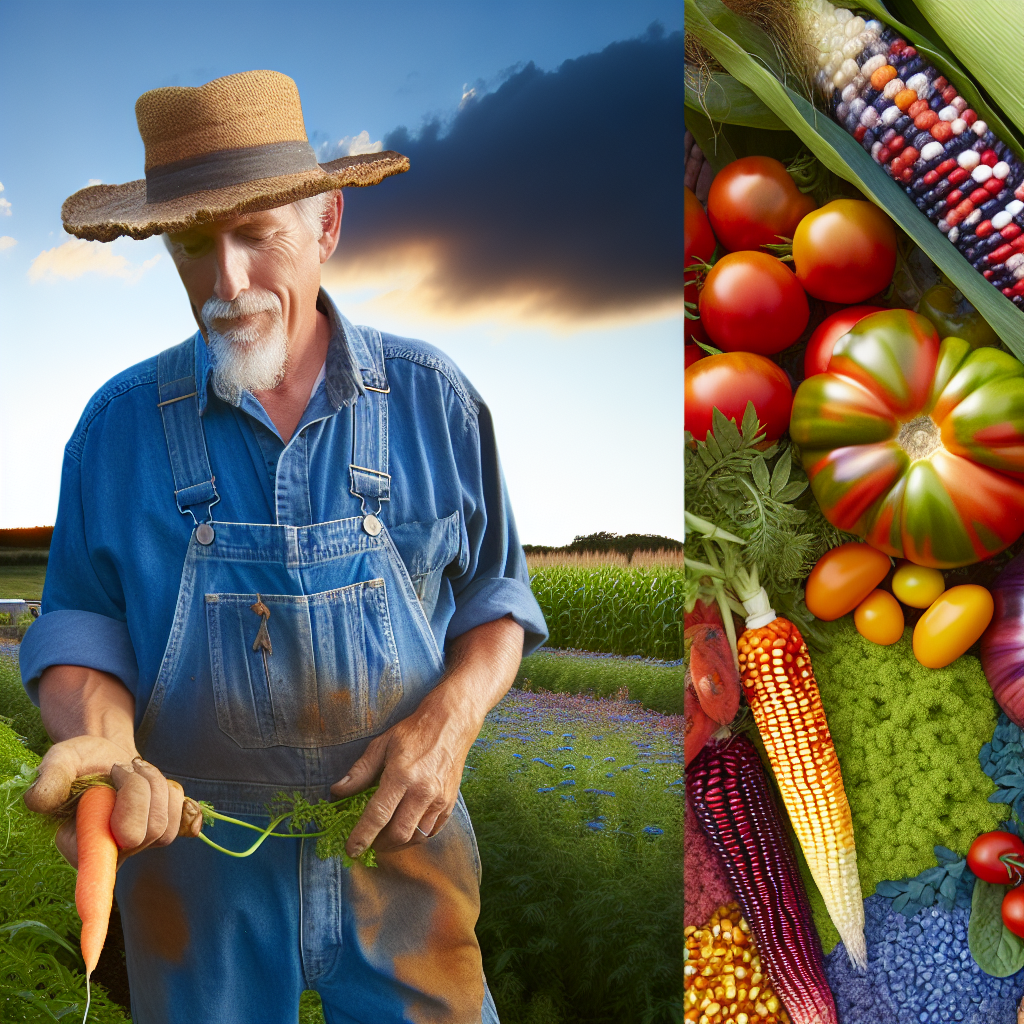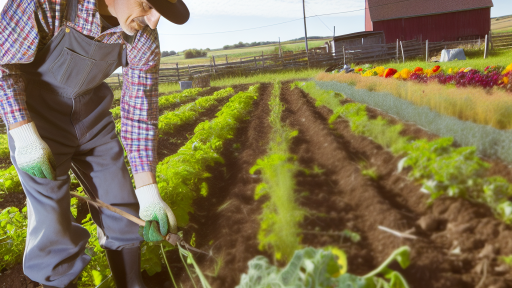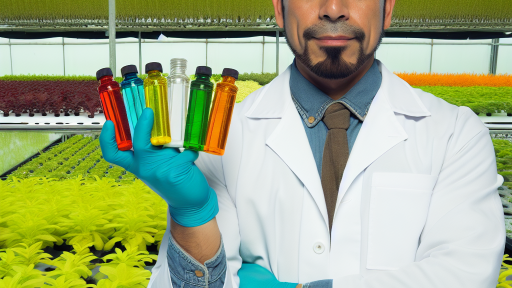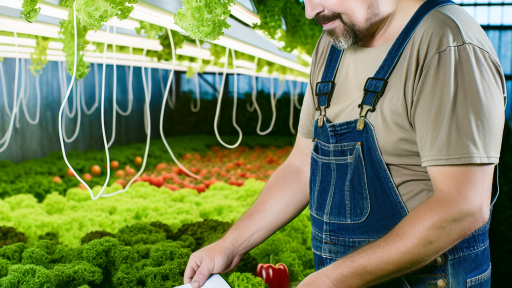Understanding Heirloom Varieties
Definition of Heirloom Varieties
Heirloom varieties refer to plants that have been passed down through generations.
These varieties are often open-pollinated, meaning they can reproduce consistently.
They usually exhibit unique characteristics not found in modern hybrids.
Additionally, heirloom varieties tend to have richer flavors and diverse colors.
Importance in Agriculture
Heirloom varieties play a crucial role in biodiversity.
They provide genetic diversity, which strengthens ecosystems.
By using heirloom seeds, farmers contribute to the preservation of plant species.
This practice helps maintain resilience against pests and diseases.
Support for Local Economies
Growing heirloom varieties can boost local economies.
These unique crops often command higher prices in markets.
Moreover, they create niche markets that can lead to greater community engagement.
Promoting Cultural Heritage
Heirloom varieties carry historical significance and cultural stories.
They embody the agricultural practices of various communities.
By cultivating these plants, farmers keep traditions alive for future generations.
Challenges of Heirloom Varieties
Despite their benefits, heirloom varieties face several challenges.
Transform Your Agribusiness
Unlock your farm's potential with expert advice tailored to your needs. Get actionable steps that drive real results.
Get StartedFor example, they might yield less than commercial hybrids.
Additionally, heirloom seeds can be harder to find, as demand fluctuates.
Farmers must educate themselves on proper cultivation techniques.
The Role of Biodiversity in Ecosystem Sustainability and Resilience
Understanding Biodiversity
Biodiversity encompasses the variety of life in an ecosystem.
It includes different species of plants, animals, and microorganisms.
Higher biodiversity often leads to more resilient ecosystems.
Additionally, diverse ecosystems can better withstand environmental stressors.
Importance of Ecosystem Sustainability
Sustainable ecosystems support human well-being and environmental health.
They provide essential services like clean air, water, and food.
Sustaining these ecosystems requires preserving the diversity of species.
Moreover, it promotes robust interactions among various organisms.
Enhancing Ecosystem Resilience
Ecosystem resilience is the ability to recover from disturbances.
Higher biodiversity enhances this resilience effectively.
For instance, diverse plant species can offer healthier soil.
They also ensure better nutrient cycling and pest control.
The Role of Heirloom Varieties
Heirloom varieties contribute significantly to biodiversity in agriculture.
They offer unique traits that can enhance overall ecosystem health.
For example, heirloom crops may resist local pests better than hybrids.
This resistance reduces the need for chemical interventions.
Addressing Climate Change
Diverse plant varieties can adapt to changing climate conditions.
This adaptability helps ensure food security in uncertain times.
Heirloom varieties can thrive in local conditions, supporting adaptive farming.
Consequently, they play a pivotal role in climate change mitigation strategies.
Community and Cultural Significance
Heirloom varieties hold cultural importance for many communities.
Showcase Your Farming Business
Publish your professional farming services profile on our blog for a one-time fee of $200 and reach a dedicated audience of farmers and agribusiness owners.
Publish Your ProfileThey embody traditional agricultural practices and knowledge.
Furthermore, they connect communities to their heritage and local foods.
By maintaining these varieties, communities foster unity and identity.
Comparative Analysis: Heirloom Varieties vs. Modern Hybrids
Defining Heirloom Varieties
Heirloom varieties are traditional plant types.
They have been passed down through generations.
Farmers often save seeds from these plants.
Consequently, heirloom varieties retain unique characteristics.
Characteristics of Heirloom Varieties
Heirloom varieties showcase diverse colors and flavors.
They often provide better nutritional benefits.
Additionally, they adapt well to local climates.
Moreover, they support local ecosystems.
Defining Modern Hybrids
Modern hybrids are the result of scientific breeding.
Farmers create them to enhance certain traits.
These traits often include disease resistance and yield.
Consequently, they can produce uniform crops.
Characteristics of Modern Hybrids
Modern hybrids typically exhibit higher yields.
They often withstand various environmental stresses.
Furthermore, they are usually easier to grow.
However, they may lack the unique flavors of heirlooms.
Comparing Nutritional Value
Heirloom varieties often pack more nutrients.
Studies suggest they contain higher levels of vitamins.
Conversely, modern hybrids may focus on quantity rather than quality.
This difference significantly affects consumer health.
Impact on Biodiversity
Heirloom varieties play a crucial role in promoting biodiversity.
They preserve genetic diversity among plants.
In contrast, reliance on modern hybrids threatens this diversity.
Consequently, it can harm ecosystems over time.
Environmental Considerations
Heirloom varieties often require fewer resources.
This approach leads to reduced pesticide usage.
On the other hand, modern hybrids might rely on chemical treatments.
This reliance can lead to environmental harm.
Consumer Preferences
Many consumers prefer heirloom varieties for their taste.
This preference has driven a surge in popularity.
Conversely, modern hybrids are favored for their consistency.
However, some consumers seek out heirlooms for their uniqueness.
See Related Content: Maximizing Yields in Hydroponic Systems
Cultural Heritage: Preserving Traditional Farming Practices with Heirloom Seeds
The Importance of Heirloom Varieties
Heirloom seeds play a critical role in maintaining biodiversity.
They offer a diverse genetic background that can adapt to changing conditions.
Furthermore, these seeds reflect the agricultural history of communities.
Connecting Generations
Heirloom varieties have been passed down through generations.
Showcase Your Farming Business
Publish your professional farming services profile on our blog for a one-time fee of $200 and reach a dedicated audience of farmers and agribusiness owners.
Publish Your ProfileThis transmission fosters a sense of connection to cultural heritage.
Families often share stories about the seeds and plants they cultivate.
As a result, heirloom plants become more than just crops; they embody tradition.
Traditional Farming Practices
Heirloom seeds encourage traditional farming methods.
These methods often utilize organic practices that promote soil health.
Farmers may rely on crop rotation, intercropping, and composting.
Consequently, these practices enhance local ecosystems.
Preserving Regional Diversity
Different regions cultivate specific heirloom varieties.
These varieties represent the unique agricultural heritage of each area.
By saving heirloom seeds, farmers can preserve localized plant adaptations.
This contributes to the resilience of regional agriculture.
Community Engagement
Cultivating heirloom plants brings communities together.
Farmers often participate in seed-sharing programs.
This encourages dialogue and cooperation among local growers.
Such interactions strengthen community bonds centered on agriculture.
Educational Opportunities
Working with heirloom seeds provides valuable learning experiences.
Schools can engage students in gardening projects.
These projects teach essential skills in agriculture and sustainability.
Additionally, they promote interest in food systems and culture.
Learn More: Pest Management in Hydroponic Farming
Economic Benefits
How Heirloom Varieties Can Enhance Market Opportunities
Heirloom varieties offer unique flavors and attributes that appeal to consumers.
This appeal creates new market opportunities for local farmers.
Additionally, heirloom crops often attract niche markets and specialty stores.
These markets value the distinctiveness of heirloom products.
Boosting Local Economies
Local economies benefit from the sale of heirloom varieties.
Farmers who grow heirloom crops tend to engage with their communities.
They often sell directly at farmers’ markets or local events.
This direct engagement fosters a strong community connection.
Promoting Culinary Innovation
Heirloom varieties inspire chefs to create innovative dishes.
Restaurants that feature heirloom products attract a diverse clientele.
Moreover, unique ingredients can differentiate menus in competitive markets.
Restaurants can also build a brand around locally sourced, unique ingredients.
Enhancing Sustainability Initiatives
Heirloom crops contribute to sustainable agricultural practices.
They help maintain genetic diversity, promoting ecosystem resilience.
Supporting heirloom farming encourages sustainable land management.
This approach can lead to further certifications and market advantages.
Increasing Awareness and Education
Growing heirloom varieties raises awareness of biodiversity.
Education around these crops benefits consumers and farmers alike.
It includes understanding the importance of preserving heritage seeds.
Workshops and farm tours can spread knowledge and attract interest.
Showcase Your Farming Business
Publish your professional farming services profile on our blog for a one-time fee of $200 and reach a dedicated audience of farmers and agribusiness owners.
Publish Your ProfileDelve into the Subject: How to Start an Heirloom Vegetable Garden

Challenges in Cultivating Heirloom Varieties
Pest Management
Pests pose a significant challenge when cultivating heirloom varieties.
These plants often lack the genetic resistance found in modern hybrids.
Thus, they become more susceptible to common agricultural pests.
Farmers must implement integrated pest management strategies.
Using beneficial insects can help control pest populations effectively.
However, this approach requires careful planning and monitoring.
Disease Resistance
Diseases can devastate heirloom crops if not properly managed.
These crops often have limited resistance to widespread pathogens.
Farmers should rotate crops to reduce disease buildup in the soil.
Additionally, selecting disease-resistant heirlooms can help mitigate problems.
Organic fungicides and bactericides are also useful tools.
Overall, proactive measures can significantly reduce disease impact.
Climate Change Impacts
Climate change increasingly affects biodiversity and heirloom cultivation.
Shifts in weather patterns challenge traditional planting schedules.
Heirloom varieties may struggle to adapt to new climatic conditions.
This necessitates research on resilient crop varieties.
Farmers must stay informed about local climate trends and projections.
Adaptive strategies include adjusting planting times and locations.
Soil Health Management
Heirloom varieties often thrive in healthy, nutrient-rich soils.
Soil degradation poses a significant risk to these crops.
Farmers can improve soil health through cover cropping and composting.
This practice enhances organic matter and microbial activity.
Regular soil testing can identify nutrient deficiencies effectively.
By maintaining soil health, farmers can support heirloom growth.
Market Access and Education
Market access can be a hurdle for heirloom growers.
Educating consumers about the benefits of heirloom produce is essential.
Farmers can build local networks to promote their offerings.
Participating in farmers’ markets raises awareness and demand.
Moreover, using social media platforms can help reach wider audiences.
Gain More Insights: Sustainable Practices in Aquaponics Farming
Case Studies: Successful Implementations of Heirloom Varieties in Diverse Agricultural Settings
Community Gardens in Urban Areas
Community gardens have embraced heirloom varieties wholeheartedly.
These gardens promote biodiversity in crowded urban landscapes.
For instance, the Green Thumb Collective in Philadelphia grows various heirloom tomatoes.
Gardeners report improved flavors and higher yields from these unique varieties.
This shift fosters community engagement and education about sustainable practices.
Small-Scale Farms Promoting Food Security
Small-scale farms thrive on heirloom varieties to enhance food security.
A notable example is the Willow Creek Farm in Vermont.
The farm successfully grows rare heirloom beans that attract local markets.
These beans require less water and are better suited for climate challenges.
Showcase Your Farming Business
Publish your professional farming services profile on our blog for a one-time fee of $200 and reach a dedicated audience of farmers and agribusiness owners.
Publish Your ProfileConsequently, the farm not only supports local cuisine but also conserves genetic diversity.
Culinary Initiatives Highlighting Unique Flavors
Chefs are increasingly valuing heirloom crops for their exceptional flavors.
One prominent restaurant, Farm to Fork, features heirloom varieties in their seasonal menus.
Customers enjoy dishes that highlight local heirloom squash and heritage grains.
This emphasis on unique flavors cultivates appreciation for traditional farming methods.
Moreover, it encourages local farmers to grow more heirloom varieties.
Educational Programs and Research Initiatives
Educational programs are critical in promoting heirloom varieties.
The Seed Saver Exchange in Iowa educates the public about heirloom seeds.
The organization conducts workshops on seed saving and crop diversity.
This knowledge transfer strengthens the community’s understanding of these plants.
Programs like these spark interest in sustainable agriculture and biodiversity.
Strategies for Promoting Heirloom Varieties to Diversify Local Food Systems
Increasing Awareness and Education
Local communities need to understand the value of heirloom varieties.
Workshops can teach the benefits of biodiversity in food systems.
Educate consumers on the taste and nutritional benefits of heirlooms.
Engage schools in educational programs on heirloom gardening.
Use social media to share information on heirloom crops.
Encouraging Local Farmers to Grow Heirlooms
Provide incentives for farmers to adopt heirloom varieties.
Establish partnerships between local seed savers and farmers.
Host events where farmers can showcase heirloom produce.
Offer training in heirloom cultivation practices.
Help farmers connect with markets interested in heirloom products.
Supporting Community Gardens
Community gardens are excellent spaces for growing heirloom varieties.
Encourage local groups to establish and maintain these gardens.
Provide resources for community members to learn about heirlooms.
Facilitate seed swaps to promote heirloom diversity.
Promote community involvement through events and workshops.
Developing Local Markets for Heirloom Produce
Support farmers’ markets that focus on heirloom varieties.
Encourage restaurants to feature dishes made with heirloom crops.
Create a local branding initiative for heirloom produce.
Connect farmers with local chefs to promote heirloom ingredients.
Utilize local food co-ops to highlight heirloom offerings.
Connecting with Food Advocacy Groups
Partner with food advocacy groups to promote heirloom practices.
Engage in campaigns to raise awareness about heirloom preservation.
Work collaboratively to address barriers to heirloom cultivation.
Leverage their networks to expand reach and impact.
Participate in community events to spread the message.




